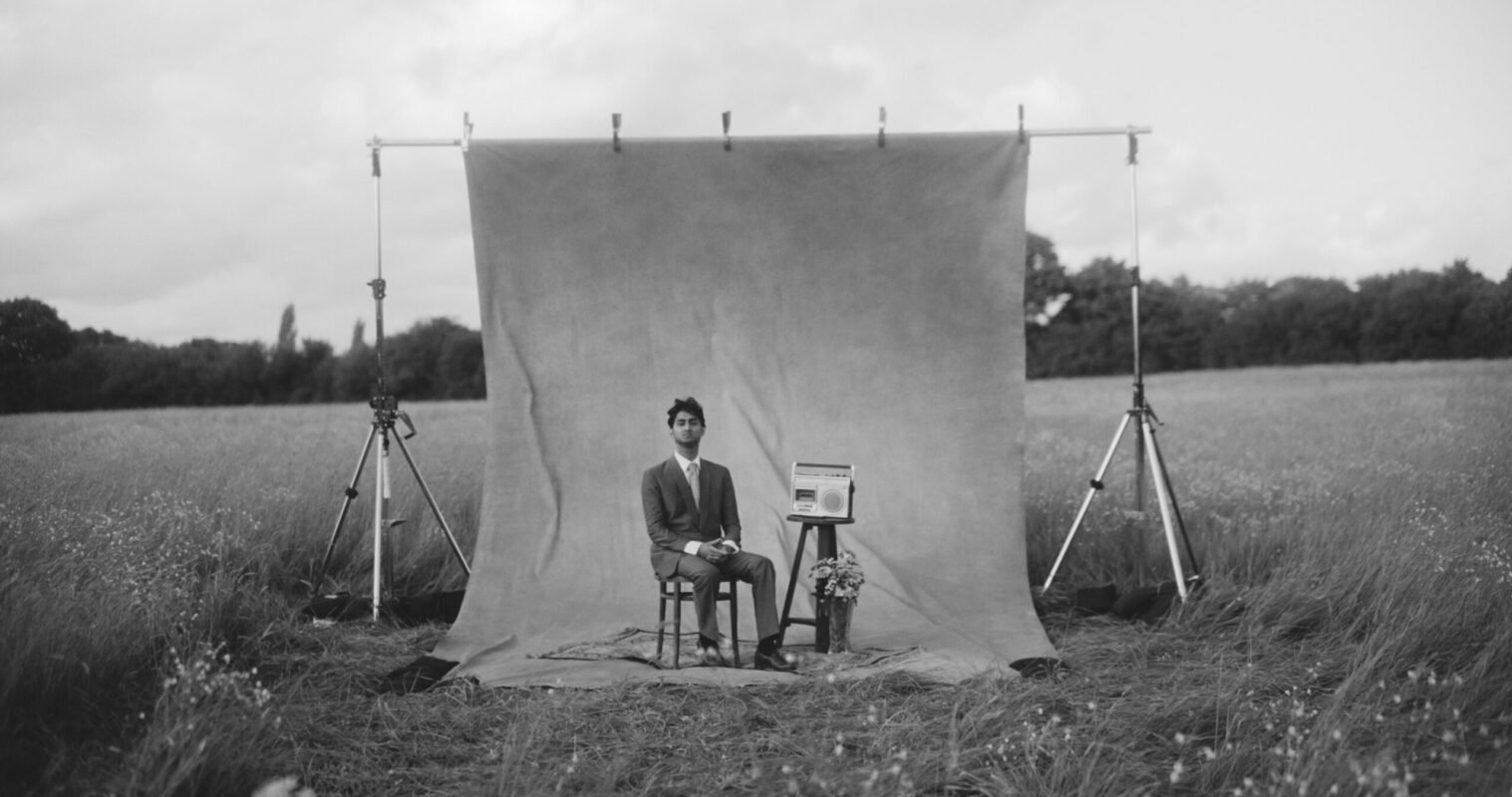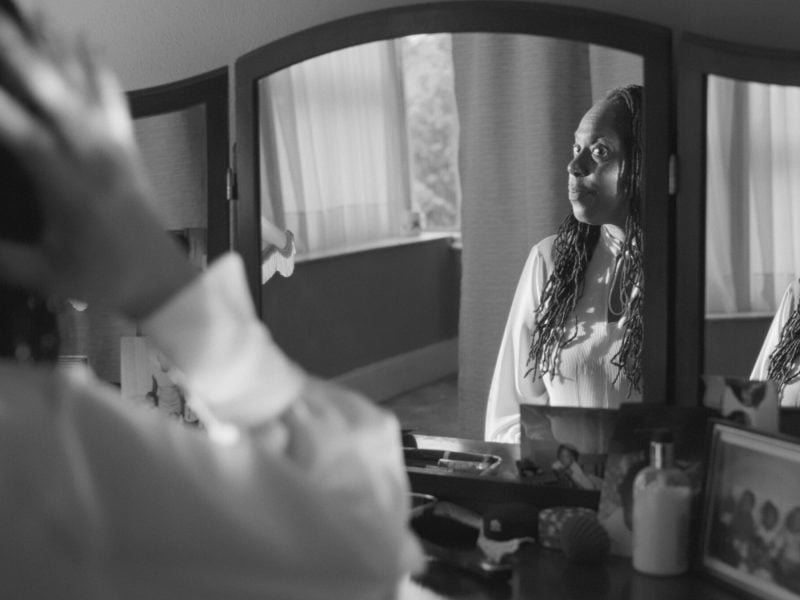Listen to the audio version of this essay on Soundcloud. (Listening time: 14 minutes 36 seconds)
[This essay contains dialogue from the film which has been italicised in the text.]
Fictions of progress that obscure the deteriorating socioeconomic conditions in the UK have plagued recent renderings of immigrant life in this country. As these uncomplicated celebrations of immigrant history and culture break new institutional ground in creative industries, the actual ground immigrant communities stand on continues to recede and diminish. Against this paradox of denial, Aburawa and Shah’s short ‘I Carry It With Me Everywhere‘ (ICIWME) offers an honest and sobering look at the material and psychic devastation of the émigré. The film draws a line across multiple temporalities and registers of immigrant life, uniting three different stories of migration in Northwest London – Punjabi, Syrian, and Jamaican – through a shared condition of fragmentation.
‘ICIWME’ is timeless exactly because these conditions of state neglect and sociopolitical dispossession have never left us. The hostile environment – the newest face of an enduring structural racism – constitutes the quiet backdrop of the film, never explicitly named, its effects felt instead through the intimate details of Iqbal, Amina, Patricia and her grandchild Kes’ lives. Against the fictions of the state as an act of willful forgetting, Aburawa and Shah utilise fiction as a way to attend to the contradictions of immigrant life – the regret, disappointment, and heartbreak produced by the experience of migration that are sanitised from the public realm of feeling.
So much of the suffering of our elders is lived in silence. By exploring what they refer to as moments of rupture along the immigrant’s journey, Shah and Aburawa recover the space of the inarticulable. Fiction here is therefore not a break from reality but its realisation, an attempt to give meaning and shape to what remains unsaid. As the camera dances between 25 and 60 frames per second, the temporal slippage between real time and slow motion magnifies these ruptures, relishing in the tensions, the constant cycles of hope and disappointment. The pacing of ‘ICIWME’ mimics the staccato of infinite endings and beginnings – frictions which are the substance of diasporic existence.
These quiet pains are most poignantly expressed in Iqbal’s character, a young Punjabi man who like many in the 80s emigrates to the UK seeking upward mobility. Iqbal’s initial optimism – I’m happy / I’m settled – unravels throughout the course of the film giving way to the eventual bitter realisation: This place takes so much from you. Disillusionment seeps in, Those stupid papers. A sense of entrapment drives his restlessness – the lens pans back and forth tracing his constant movements through a grid of narrow streets, corridors, pavements, and alleys. He is driven by a search for his place or something more than the trappings of migrant aspiration.
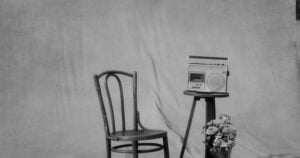
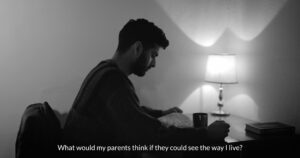
[Descriptive text: Two film stills in black and white arranged side-by-side. Left – medium shot of a photo studio setup consisting of an empty wooden chair, flowers, and radio on a high table. Right – medium shot of Iqbal’s side profile. He sits at his desk ready to eat. There is a weary look on his face; his arms are outstretched on the table as he looks down blankly at his food. The bottom text reads “What would my parents think if they could see the way I live?”]
In a single cut, a month turns into six years – a litany of missed birthdays, baby showers, weddings, funerals are the only indication of seasons passing. Time does not do away with Iqbal’s nauseating malaise. Six years I haven’t seen my mother’s face. The camera surveys his humble inventory of recollection, an attempt at a tender memory: pictures of warm, open, and inviting faces on the wall, a Qur’an, a table strewn with cassette tapes and books of literature, two worn suitcases announcing diminishing chances of a homeward journey, a tape recorder. And yet the likeness of his loved ones recedes in his memory, reduced to the simple projection of portraits he carries of them. Their connection is frozen within these captured moments. All of relation confined to an image. Time is both a witness to the accumulating too lates/not yets and the hurdle to the delusion of reversal. Migration is a one way trip, notes Stuart Hall. Iqbal cannot return without reversing the hands of time and so yearning becomes his form of time travel.
Cassette tapes too travel between Iqbal and his past life, they go where he cannot. With each new recording he makes, the question is more pressing: what to say and what to leave out? Iqbal must maintain a fantasy of the good life that makes the sacrifice of his journey worth it. An entire world of familial expectations and responsibilities as well as the nature of the very bond he has cultivated to his community hinges on this fantasy. Thus for the diaspora, speech is defined by its omissions and silences are just as informative as the spoken word. They are an expression of what defies articulation in the immigrant experience or what feels too dangerous to amplify; what loved ones must be protected from knowing, what we must be protected from uttering.
We belong to God and to God we return / At first it was in anticipation of someone’s death / But now I think it’s appropriate for this life too. Iqbal is resigned to a life of elegy. Loss that begets Loss. Loss that recreates itself.
Death is yet another rupture. Perhaps the most enduring. On the day of her mother’s wake, Amina – a second generation daughter of the Syrian diaspora – grapples with loss on multiple levels and of multiplying scales: a loss of life, love, land, and legibility. It feels too big and wide to hold. The grief comes as a faint, distant ache at first punctuated by the words of her mother’s ghost ringing in her ears: I wish you could see how beautiful it is / You know it was the only place I wanted to live and to die in / Do you remember it at all Amina? An unfulfilled longing swells in Amina’s chest. The absence of her mother is more than the physical absence – it is the severing of a connection to a Syria that promised a different and vital experience of herself; a knowledge that remained speculative but integral to her legibility. Her mother was not only the bridge but the certainty that something was on the other side, and that it was hers to claim. Now, that vast possibility, that suspended dream, drifts even farther from her reach. That place does not exist anymore whispers Amina’s father somberly.
Place, person, and memory coalesce into one in Amina’s story – her mother’s devotion to the homeland has made her inseparable from it. Death brings up a complication: how to disentangle one from the other? How do we create anew a relation to a home/community that has only been mediated through our elders once they depart? How do we live up to the expectation of memory? Death exposes the fragility of Amina’s connection to the homeland. Lingering close-ups of Amina’s fraught expressions and the uniform, white landscape of her mother’s wake add to her sense of confusion and placelessness. The grief is compounded by its illegibility, its formlessness. Amina feels the weight of the irrecoverable in her being even as she struggles to name it, to find its edges, or comprehend its magnitude.
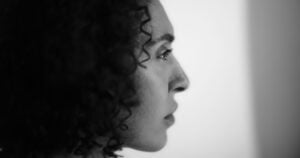
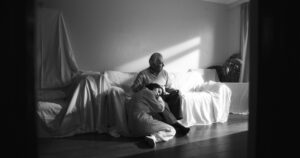
[Descriptive text: Left – close-up of Amina’s side profile. She has a pensive look on her face; her thick black curls frame her face. Right – a wide-shot of Amina and her father in a living room that is sun-filled and covered with white sheets. She sits on the floor with her head in her father’s lap as he consoles her]
In contrast to Iqbal who is animated by a relentless motion, Amina is unnervingly still, occupying a stagnancy or a stuckness, unable to chart a way forward without the coordinates to somewhere else. She digs her feet deeper in place, willing a relation to emerge. The smell of wet earth evokes a nostalgia that is disembodied from location. The soil here is just like the soil over there / It’s just the same. The equivalence is both a comfort and a symptom of her disconnection.
While the promise of return haunts Iqbal and Amina, Patricia – a member of the Windrush generation – is under no such illusion. For her, the architecture of place lies in the flesh and blood people who populate it. Home is not its physical coordinates, but the temporary gathering of love, care, and solidarity in space. Temporary because migrants in the UK can never live without a certain vulnerability born of the fact that the configuration of colonial, racial relations that seek to disperse them were never fundamentally transformed – the mechanisms by which they continue to operate have simply evolved. These kids think this is something new. Patricia resists both the temptation of political and historical amnesia that exceptionalises the current phase of state violence as well as the despair it engenders. Her candidness is not informed by cynicism, but by a simple question: if we live in the legacy of colonialism, how can we be surprised when it rears its head? I’ve been having this conversation since as far back as Jamaica.
Accepting that our pain is not unique, that it is historical and recurrent, and that we are each just one spark amongst many in the flame of memory is difficult. It forces us to grapple with the burden of a shared grief much larger and more persistent than our own. But if we allow such a recognition, it can enlarge our understandings of ourselves and facilitate a collective responsiveness – rather than a private suffering – to the realities of state neglect. Structural violence robs us of this potential, it shatters the possibility of declaring and acting on the real, shared conditions of our lives, separating us into silos. Patricia’s image is splintered in the mirrors of her dresser, reflecting the effect of that fracture.
Patricia is fluent in state-sanctioned cycles of loss, but her grandson Kes is only beginning to name that encounter and grapple with an inheritance of endings. We see him weave through the streets of Harlesden with the ease of belonging, occupying that space with a confidence that Iqbal could never claim. His comfort is challenged by the spectre of gentrification, an ongoing project cum social cleansing of neighbourhoods, decimating black communities since the 2008 financial crisis. My dad was telling me how much they fought for that space / Everything we have gets taken away / Everything he laments about the closure of Bridge Park Community Centre. Kes’ rootedness becomes another vulnerability. The state’s logic of dispossession is everywhere and he is hungry for flight. His itch for a departure is predicated on the promise of leaving the adverse economic realities plaguing his community, the failed story of national belonging, his pains and betrayals behind. Patricia knows too well that departure makes of one the conduit for what is deserted. All those remains, all those ruins locked in the body and spirit from which there is no migration. Leaving, in some ways, is its own form of return.
It was never really ours / I keep telling you / Of course these places matter / but they are not us. Aburawa and Shah invite us to ask what can emerge once we uncouple our sense of home and identity from a physical location? For Patricia, the project of using state technologies to demarcate a space for ourselves within its bounds is a flawed one. What becomes visible when we exist outside of that colonial imagination, when our sense of belonging is tethered to a living and existing alongside each other, beyond a geography of borders, exchange, and subjecthood? What appears when we encounter our expendability from a regime of nation-building as both our tragedy and possibility?
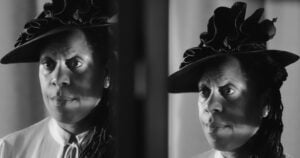
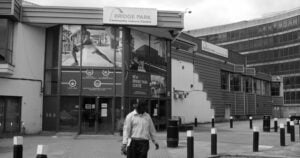
[Descriptive text: Left – medium close-up of Patricia’s image refracted on the mirrors of her dresser. Her dreadlocks are arranged to the side; she wears a blouse and an elaborate organza hat. Right – a wide-shot of Kes walking towards the camera, his gaze fixed backward on Bridge Park Community Centre in the background]
Aburawa and Shah unite chiasmatic stories of migrant life in Britain through a shared language of displacement that retain a continuity of circumstance despite their differences. ICIWME contests the trite binary of agency versus subjugation that is rife in depictions of immigrants on screen. It instead generously opens up another space to think seriously about what it could mean to engage in a process of collective-fashioning, collective-becoming that exploits extremely limited possibilities for either. For Iqbal, his faith becomes the way he is able to experience a sense of newness everytime it is threatened to disappear. Amina finds her solace in surrendering to a life of questioning without answers, to a lifetime of attempt, and attempt, and attempt.
Patricia’s commitment on the other hand is to a borderless community that shapes her, the shared breath of an entangled life sits above the bricks and mortar of place. My belonging is with my people / With you. Each is a unique practice of hope, spelling the sound of love’s revival and a refusal to surrender to a sense of impossibility. ICIWME embraces the inventions of home-making as the substance of this hopeful practice. Return too is reframed by Shah and Aburawa, not as the recuperation of what was, but as the collective authoring of a memory and language of freedom for what might come next. Return not as the reversal of displacement, but as the dismantling of the conditions that make displacement thinkable. As the practice of creating a world that makes space for all of us in it.
Leena Habiballa is a London-based writer and filmmaker interested in Sudanese visual cultures and archival film practices that use state and colonial archives against themselves. Her film, ‘Dead As A Dodo’, has screened at MENA Film Festival, Spectral Grounds: Black Experimental Film programme, and Habibi Collective’s Sudan Film Factory programme. Her essays have appeared in Nka: Journal of Contemporary African Art, Danish Film Institute, Media Diversified, and Tropics of Meta. She holds a PhD in the Cellular and Molecular Biology of Ageing from the Mayo Clinic and Newcastle University.

